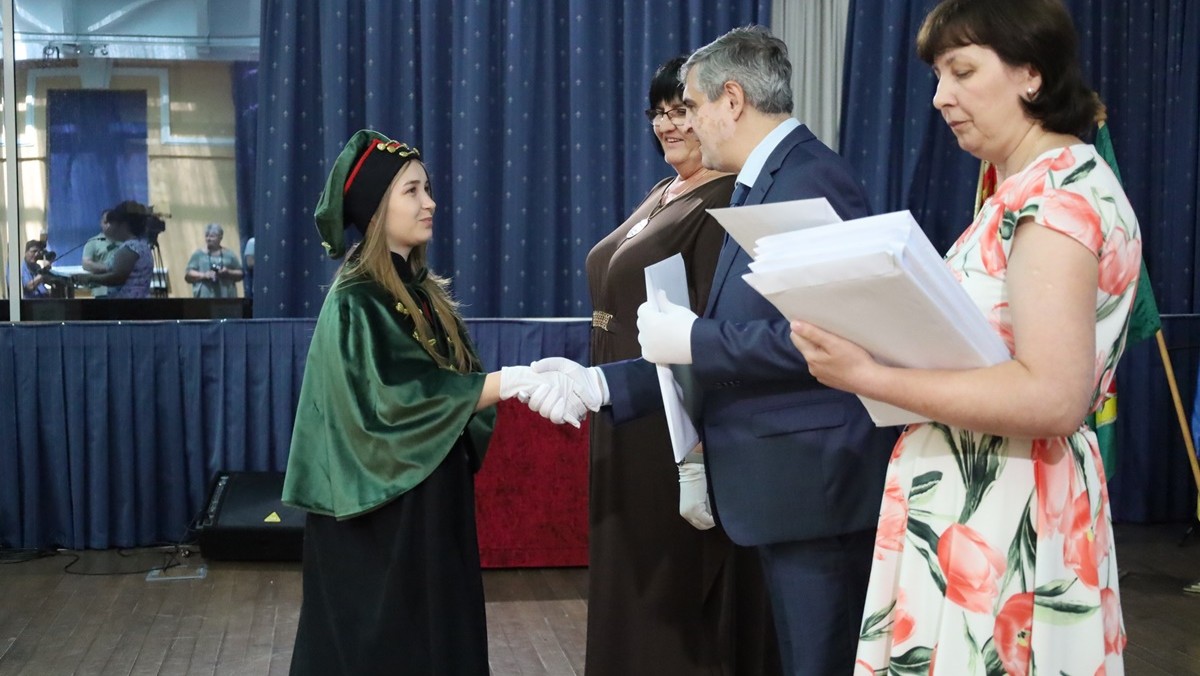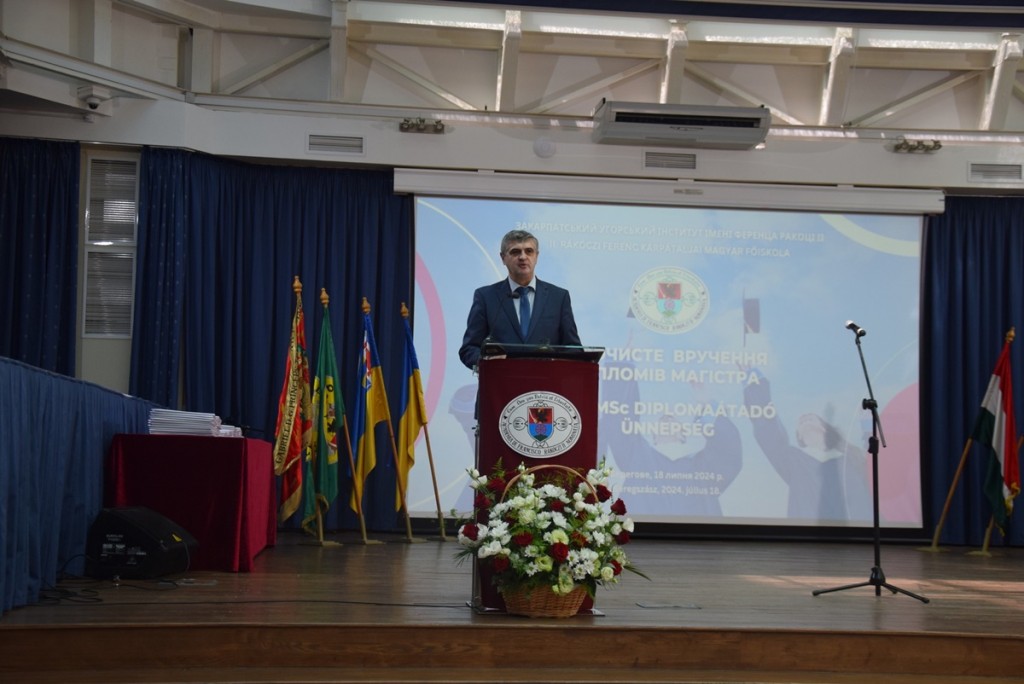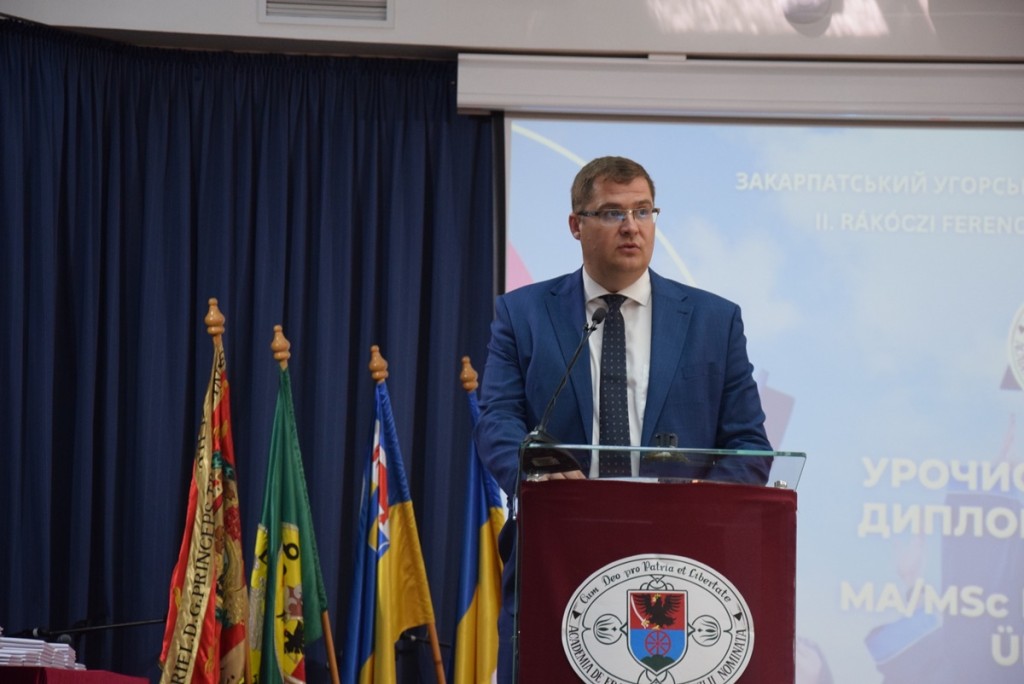Master’s degrees awarded at Rákóczi College
On July 18, the Ferenc Rákóczi II Transcarpathian Hungarian College of Higher Education held the final act of its graduation ceremonies. This year, a total of 74 students earned their master’s degrees. 24 students graduated with honors.
The ceremonial event began with Erzsébet Kokas, folk singing teacher of the Tulipán Tanoda Hungarian School of Folk Music and Folk Art, performing the folk song “Hallottad-e hírét Bereg vármegyének?” followed by the national anthem and the Rákóczi College anthem.
István Csernicskó, the rector of the college, in his year-end speech, highlighted several innovations the institution has introduced to higher education in Ukraine, that were initially unrecognized by the system but later recommended by the Ministry of Education as new opportunities. Twenty years ago, the college advocated for the simplification of the recognition of scientific degrees obtained in Europe, the initiation of joint programs with foreign universities, the official employment of renowned foreign professors in domestic higher education, the encouragement of foreign study trips and partial studies, and the establishment of the legal background for institutional and international accreditation.
“A good example of this is that we are currently the only higher education institution in all of Ukraine that has international institutional accreditation,”
he said.
Our achievements have been recognized in national and international university rankings. In Ukraine, the college ranked 211th among higher education institutions in 2023, a jump of 21 places from 2022. In the “ТОП-200 Україна 2024” ranking, the institution advanced to 155th place, moving up 30 positions from 2023. In the Webometrics ranking, which lists more than 31 000 higher education institutions worldwide, the college advanced over 1 700 places from its 2022 position to 2023.
István Csernicskó also spoke about institutional successes alongside internationally recognized scientific achievements: the first diploma-awarding ceremony in the college’s history was held on June 20, 2001. The first diploma was awarded to Diána Ábrány, a colleague specializing in teaching. The first master’s degrees were awarded in 2017, the first to András Bátyi a mathematician, the hundredth to Marianna Osztrovszka, and the hundred-and-first to Olexandr Osztrovszkij, who are a married couple and staff members of the institution. Their example is not unique, as approximately two hundred young people have found their partners at the college, resulting in over a hundred marriages among former students.
“Behind the statistics, numbers and data are people, faces and stories. The achievements we have discussed so far are the result of the work of many people. I thank the colleagues for their contribution to these successes, and the students for honoring us with their trust when they chose us,”
concluded the rector.
Following this, the melodies of the Rákóczi March were played on the accordion by Nikoletta Sipos, an instructor at Tulipán Tanoda, and Bertalan Halász, an instructor at Rezeda Folkműhely.
“Do, create, enrich – sounds the program of Hungarian national renewal, written by Ferenc Kölcsey. We often quote this sentence and perhaps do not even realize how timely and enduring it is,”
began János Nagy, Secretary of State leading the Prime Minister’s Office, in his welcoming speech.
He elaborated that influencing each other, creating together and enriching each other can only be achieved through cooperation, which the Hungarian government always supports under all circumstances. According to him, those who want to influence, create and enrich are heralds of active patriotism, people of the future and hope. The present must be compared with the distant future, which currently holds dark clouds on the horizon.
“We do not know what this future will be like, but we are here today because we believe that there will be one here in Transcarpathia. Among you are the Hungarian future’s teachers, mathematicians, economists. Professionals who want, can and will do, create and enrich Transcarpathia,”
he added.
Next, Aljona Meljnicsuk’s song “Ébredés” was performed on the piano by Ágnes Bíró, a student of the Zoltán Kodály Fine Arts School in Beregszász, and her teacher, Szvetlána Barna.
On behalf of the graduating students, Katalin Mészár, a Hungarian major and full-time student, expressed gratitude to the teachers and parents, bidding farewell to the alma mater and fellow students.
She was followed by Alexandra Tóth, a student of Tulipán Tanoda, who played Bukovinian melodies on the violin, accompanied on the accordion by Nikoletta Sipos. The preparatory teacher was Boglárka Botos.
Afterward, the students took their oaths, led by Oxána Molnár, a Ukrainian major and full-time student.
The graduates then received their well-deserved diplomas from Ildikó Orosz, the president of the Rákóczi College and István Csernicskó. For those participating in the joint program with the University of Miskolc, in addition to the college’s leaders, Zita Horváth, the rector of the University of Miskolc, also congratulated. This was followed by the student anthem.
Ildikó Orosz began her speech with the experiences of Viktor Frankl, an Austrian neurologist who survived a concentration camp: the ultimate human freedom is the ability to choose our attitude in any given set of circumstances.
“It is up to us whether what we experience makes us stronger or weaker, increases our faith or our fear, makes us better or more bitter people,”
she concluded, and then placed the survival advice of Father Placid on the hearts of the audience: “suffering should not be dramatized, joy is necessary for survival, we are not perfect, but we must show here and now that we are different, and finally, those with something to hold on to it is easier.
She was followed by senior and junior Ferenc Csetneki, teachers at Tulipán Tanoda, who performed the song “Dona nobis pacem” on the tárogató.
At the end of the event, representatives of the historical churches – Sándor Zán Fábián, bishop of the Reformed Church in Transcarpathia, János Molnár, episcopal vicar of the Roman Catholic Diocese in Munkács and parish priest of the Roman Catholic Diocese in Beregszász, and István Marosi, Greek Catholic priest – asked for God’s blessing on the lives of those present.
The ceremony concluded with the singing of the Szózat.
Anita Kurmay
-
This article is also available in
Українська
Magyar



